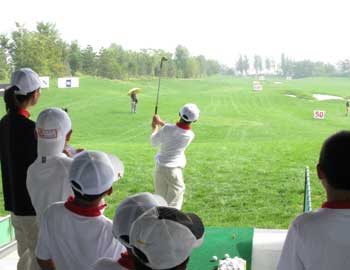Captivated by the sport since the age of three, Benjamin has practiced every day at his school's driving range. He recently asked his Dad if it would be OK to join the PGA when he reaches his 10th birthday, but now grins broadly when this gets mentioned.
"I think maybe 10 is a bit early. Maybe I'll wait until I'm 14 or 15," he says earnestly.
His dad says his child's obsession with golf is so great his ama (nanny) once found him practicing his swing in his sleep. Benjamin, however, is at pains to point out that his is a far more rounded personality than that. "I sometimes think about other things," he explains. "I play football at school at playtime and lunchtime. And we play with computer games with each other. I like Dragon Fable!" he says empathically.
But Benjamin's passion remains with golf, and his father Franky Huang Weihan is convinced that the HSBC National Junior Golf Championship events have added fuel to the fire that burns in his young son. "This is a really good environment for Benjamin to compete with the other kids. It's one of the best tournaments, it's well organized. It's good exposure. He's definitely improved with each tournament. We've found that his golf has become more mature, more refined," says Mr. Huang, the President and CEO of a real estate investment company.
"Tournaments are very important to keep him motivated. You can't just train every day as a kid. Tournaments are like having a test in school. It gives you a milestone to aim at. Once you reach that milestone you can set another goal. That's what keeps their interest. Without these tournaments it wouldn't be healthy, they'd end up being pushed by the parents and pushed by the coach and they'd get fed up with it. The tournaments help the children focus."
It's not just the children who have become more focused since the China Golf Association and the world's local bank launched the HSBC China Junior Golf Program in 2007. Creating a mini-tour of six regular stops and a final, and adding their support to the HSBC China Junior Open, form part of a strategy that includes a series of summer and winter golf camps aimed at introducing youngsters to the sport. The program has also introduced golf training in schools. That's up and running in Beijing, Yunnan and Hefei and starts in Shanghai this year. With PE teachers being coached in the art of coaching and supplied with equipment it's estimated that at least 30,000 children in China will touch a golf club for the first time in their school this year alone.

|
|
Target Golf: Some of the younger competitors take part in a fun skills competition designed to keep the fun in the game in. [HSBC China Junior Golf Program]
|
The structure also allows the CGA to track the development of young players, because the consistent course set up at the HSBC National Junior Championship events permits a meaningful rankings system to be compiled – a crucial element in a country the size of China.
But the direct impact of the program is increased dramatically by the less tangible side-effects. The increased publicity the championship has generated for junior golf has increased the number of other sponsors backing additional junior tournaments.
Meanwhile each new host venue becomes increasingly aware of the need to foster junior development. Having hosted a leg in Kunming, the Yunnan Golf Association successfully petitioned the province's courses to agree a maximum green fee for juniors. In Shandong, it's said that a group of parents have managed to persuade their course to slash the price of rounds for children during the summer holidays. To golfers from more mature markets this might seem logical, but the top-down development of Chinese golf courses and their profit-driven structure has meant that children are not seen, let alone heard, on the tees nearly as often as one might assume.
"The HSBC China Junior Golf Program is the true legacy of the HSBC Champions," explains the bank's Group Head of Sponsorship, Giles Morgan. "Bringing players of the calibre of Tiger Woods and Phil Mickelson to Shanghai each year has helped popularise the sport, but it is the junior program and these kinds of knock-on effects that will accelerate the growth of the sport. I don't think people realize just how new golf is in China, and given the scale involved, how challenging trying to get the right structures in place has been for the CGA. We've been able to give them the financial support and to share some of our expertise in helping them create the system. It's a system that is directly and indirectly helping to expose more and more youngsters to the game and at the same time is energising the children already playing at a high level."